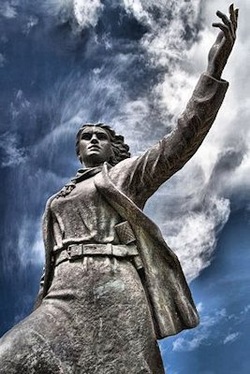Molly Bloom's seventh heaven

Molly Bloom here marks the second anniversary of her first online appearance with her seventh collection of fine poetry.
Though leaning towards a modernist aesthetic and an experimental approach to language, Molly Bloom is not much interested in poetry that makes no attempt to engage with the world.
As Robert Vas Dias says of his deeply engaged Black Book – on which he is collaborating with the artist Julia Farrer – three pieces from which are presented here: "Art is not a matter of laissez-faire, it's an individual commitment to the times we live in, the images that seize our imaginations, and the people we live with, including ourselves. Black Book registers our outrage at the inhumanity of humanity, analogous to the ways in which war poets, war artists and photographers, and journalists have always worked and exhibited."
Vas Dias's experimental methodology, in particular but not exclusively aleatory, is typical of techniques employed by many of the writers published and admired by Molly Bloom.
He says: "Some of the poems exemplify the idea of synchronism to reflect the occurrence of similar events at similar times but in different places. Others are composed by chance-determined procedures, which illustrate Jung's concept of synchronicity: 'the phenomenon of events which coincide in time and which appear meaningfully related but have no discernible causal connection' (OED); this relationship was expressed by Jung as the 'paranormal' occurrence of 'meaningful coincidence'. (I would say that 'intuitive' poetry is based on the apperception of meaningful coincidence in one's experiences and in the imagination.)"
Which, coincidentally or not, is just what I wanted to say here.
Aidan Semmens, editor, May 2015
In Molly Bloom 7:
Lorrie Goldensohn
Richard Berengarten
Dorothy Lehane
Anthony Mellors
Carrie Etter
Lucy Hamilton
Mark Young
RD Parker
Ian Davidson
sean burn
Ralph Hawkins
Robert Vas Dias
- “I have never reached the true centre, where art is pure politics” – Tom Raworth
